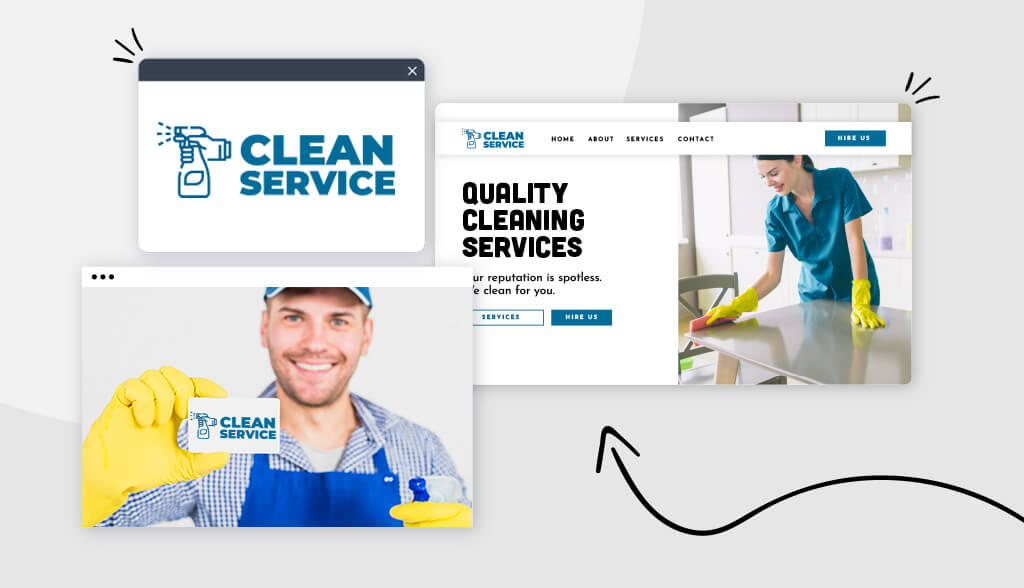There are plenty of reasons why starting a cleaning business is a good idea. Compared to many other ventures, cleaning businesses are easier to start and have lower entry and running costs.
Plus, you don’t need training or qualifications for most cleaning jobs, you can work part or full-time, and there’s always a steady demand.
Sounds almost too good to be true! So, what’s the catch?
Cleaning’s a tough gig, and when you start a cleaning business, you’ll work hard for modest profits. You’ll need a strong work ethic, determination, and patience.
But if you stick with it and run your business right, starting a cleaning business could be a lucrative and rewarding career.
Choose a Cleaning Niche
You have 3 cleaning niches to choose from when you start a cleaning business: Residential, commercial, and specialist. Which you choose depends on your budget and the type of work lifestyle you prefer.
Specialized and commercial cleaning services cost more to start, but competition-wise, it’s easier to get clients in residential cleaning because of the vast number of houses compared to businesses.
Let’s do a clean sweep of all 3:
Residential
Residential cleaning businesses provide cleaning services at their client’s homes during working hours and supply all cleaning equipment and products. With residential, you’ll work with clients to provide a detailed cleaning service.
Standard residential cleaning services are:
- Sweeping and mopping floors
- Vacuuming carpets and rugs
- Cleaning bathrooms
- Making beds and changing linen (often an additional service)
- Cleaning kitchen appliances and doing the dishes
- Emptying trash
- Cleaning door handles and light fixtures
- Dusting all surfaces
Some pros of residential cleaning are you canoperate with little capital. It’s daily work and you’ve got a broader target audience. While the cons are residential cleaning is more detail specific and you’re dealing with the public.
Commercial
Commercial cleaning businesses have trained employees who use specialized equipment, products, and technology to clean and sanitize commercial buildings.
With commercial, you won’t meet clients; you’ll work at specific times and cover larger areas, so you’ll work faster and less detail-oriented than in residential cleaning.
Commercial properties you could clean are:
- Medical and healthcare facilities
- Schools
- Restaurants
- Government buildings
- Fitness centers and gyms
- Retail stores
- Car dealerships
- Warehouses
- Banks
With commercial cleaning, 4 or 5 regular clients can be enough to keep you in business. But the cons are the unsociable work hours (cleaning takes place at night and on weekends) and you may need specific licenses and permits.
Specialist
Specialist cleaning services are a micro-niche within a niche where you provide a specific service for a particular activity or sector.
With specialized, you’ll need specific licenses and permits, various skill levels, and meet particular hygiene, cleanliness, safety, and even security requirements.
Specialist cleaning teams must complete projects with 100% professionalism and pay attention to detail.
Specialized services can range from:
- Disaster cleaning and restoration
- Post-death and trauma cleaning
- Emergency room cleaning
- Cleanroom cleaning
- Heritage homes cleaning
- Museums
Decide what services to offer
Once you’ve chosen your niche, you can define it further by deciding what services you’ll offer.
When defining your services, consider your locality and demand because your goal is to increase business, not reduce it.
There are many types of cleaning services to choose from:
- Regular cleaning: Standard cleaning duties
- Deep cleaning: More comprehensive, including spring cleans
- End of tenancy cleaning: Move-in/move-out cleaning
Here are some other popular cleaning services you could offer:
- Laundry and dry-cleaning services
- Eco-friendly cleaning services
- Pressure washing services
- Drapery and blinds cleaning
- New construction cleaning, getting properties ready for sale
Choose a Business Name
Choose a Business Name
Choosing a business name can be difficult because it must be catchy so people remember it, appear professional, and project the right impression.
Your business name must also reflect your values and the service you provide to connect with your target audience.
Here are some industry tips to help you choose yours:
- Pick a name between 2 and 4 words long
- Ensure it’s easy to pronounce and spell
- Include industry-relevant words like clean, cleaners, cleaning, maid, and maids
- It must be easy to type, so people find you on the web
- Not too similar to a local competitor
- Is available as a domain name
Start by choosing your industry term (like maid, clean, cleaners), then add a catchy or descriptive word before or after it.
Some cleaning business examples to show you how it works:
- Maid for LA
- Maid in Manhattan
- Ready-Maid Maintenance Services
- Vanguard Cleaning Services
- Busy Bee Cleaning Service
The Maid for LA cleaning company uses a creative industry-relevant name.

Once you find a name you like, say it out loud to yourself and other people, have them repeat it back, and ask for opinions.
Behind every great business name, there’s an even better tagline; I’ll explain more next.
Consider a tagline
A tagline is a slogan or catchphrase used in advertising.
Its purpose is to grab attention and create a positive, memorable impression, so people identify the brand with the tagline marketing message.
Here are some you might know:
- “Just do it,” – Nike
- “Taste the Feeling,” – Coke
- “America runs on Dunkin,” – Dunkin’ Donuts
How to write a memorable tagline:
- Keep it simple: Memorable slogans use short words, less than 3 syllables
- Make it short: Catchy taglines are 3 to 6 words long
- Retain clarity: Leave nothing to the imagination; say what you mean and make it obvious
- Evoke the right emotions: Taglines evoke emotions, so figure out what emotions you want your target audience to feel
- Emphasize the benefits: Customers care about the benefits your service brings to their lives, so say it in your tagline
Some catchy cleaning business taglines:
- We don’t cut corners, we clean them
- Our reputation is spotless
- Don’t stress about the mess
Plan Your Budget
A cleaning business’s start-up costs can be pretty low, which means if you start small you shouldn’t have to borrow and can expand as you take on more clients.
Your budget depends on your cleaning niche and services, whether you’ll work alone, and your location.
Here’s a rundown of the essential equipment, supplies, and staff costs:
Equipment
One of the first things you’ll need is a vacuum cleaner. If you’re cleaning commercial, you’ll need a commercial-grade vacuum cleaner; for residential, a cordless backpack vacuum cleaner is brilliant. Both commercial and cordless must have a high HEPA rating to reduce airborne dust particles.
You’ll also need commercial carts, trolleys, and residential cleaning trays help store your products and keep everything at hand.
Professional carpet steam cleaning is a service that needs high-quality equipment. Still, you can buy smaller steam cleaners suitable for rugs, drapes, upholstery, soft furnishings, and mattresses.
Supplies
Supplies are the items you’ll always use and have with you at every job. You’ll need them to start your cleaning business and have to replenish them every so often:
- Mop and bucket
- Brush and dustpan
- Dusters, rags, and cloths
- Spray bottles
- Disinfectant and all-purpose cleaners
- Window cleaner and squeegee
- Gloves
- Bathroom cleaner and toilet brushes
- Garbage bags (strong ones)
Staff costs
You can employ people in 3 ways: Part-time, full-time, or per-job.
The average U.S. salary for employing a cleaner is $13.75 per hour, dropping to $12.39 per hour in St. Louis and rising to $17.43 in New York.
The Small Business Association tells us that staff costs are 1.25 to 1.4 times more than an employee’s salary. So, a wage of $35,000 could cost you as much as $49,000.
Also, consider when employing staff you must pay 50% of any employee’s social security and Medicare taxes and contribute to state unemployment and federal unemployment tax.
You can find the rules for employing staff in the U.S. on the Small Business Administration website.
Vehicle
You’ll need a vehicle to get yourself, employees (unless they have other modes of transportation), and equipment to cleaning jobs.
When you start a cleaning business, you can use your own vehicle, which helps reduce costs, but you might need a large company vehicle if you have a crew.
One option is to lease your cleaning business vehicle or buy second-hand until you can afford a shiny new mode of transportation.
Get the Required Insurance and License
You’ll also need specific insurance policies, licenses, and permits to start a cleaning business. Working without them is illegal and can land you with hefty fines.
Every state has its own insurance and license requirements. Research the U.S. Small Business Administration and look for links to your state’s business license website.
Most states require you to get the following licenses, permits, and insurance policies to start a cleaning business:
Service contractor’s license
A contractor provides a service to a client but doesn’t work for them as an employee. Anyone providing a service (even once a week) to a paying customer needs a service contractor’s license.
Most states require you to get a contracting license before beginning your business. You’ll find your state’s district office contact details on the SBA website.
Business license and permits
Most states also require you to have a business license to operate. A business license is a government document that proves you own your cleaning business and have approval to operate in your state.
Your license and permit requirements depend on your business activities and location. You can find out more by visiting your secretary of state’s website or contacting your local government business license department.
Cleaning business license
Some states require you to get a specific cleaning business license. When you contact your local government business license department, you can ask about this.
And depending on your state, you might need a janitorial surety bond before getting a cleaning business license.
Cleaning business bonds
A cleaning business janitorial bond is an insurance policy that protects customers from any damage caused by you or your employees while cleaning their property.
A janitorial bond doesn’t provide commercial insurance; it only covers your client’s losses.
You’ll need additional commercial insurance to protect your cleaning business from financial losses, including general liability, professional liability, and worker’s compensation.
General liability insurance
General liability, also known as slip-and-fall insurance, is a must-have for any cleaning business. Itprotects you from third-party lawsuits of bodily injuries and property damage caused by your business.
Business owner’s policy
Business owner’s policy insurance provides coverage for loss or damage to your building, inventory, and equipment due to fire, theft, vandalism, and specific weather events.
Workers’ compensation insurance
Worker’s compensation insurance covers the costs of employees who get injured or sick while at work, including medical expenses, lawsuits, disability benefits, and loss of wages.
Almost all U.S. states require any business with one or more employees to have workers’ compensation insurance.
Register Your Business
Registering a business means filing a legal entity structure with your state, such as forming a limited liability company. Let’s look at what your choices are:
LLC
LLC is the abbreviation for limited liability company. It’s a business structure that provides the personal liability protection of a corporation and the tax structure of a sole proprietorship.
So, if someone sues you, only your business assets are at risk, and you pay on your tax return.
For most new business owners, those are the reasons they choose the LLC structure.
But as a cleaning business, you might need to register as an LLC to enter the commercial or specialized cleaning sectors.
Sole proprietorship
A sole proprietorship is the easiest way to begin a business, especially for those who work with residential clients and don’t employ staff. There’s no formal action required to form a sole proprietorship. If you’re the owner, you are a sole proprietor.
The downside is that there’s no separation between you and your business, so your assets are at stake if someone sues you. Sole proprietors trade using their name; if you want a catchy business name, you must filea doing business as (DBA) name.
Doing business as
A DBA is how you can trade as a sole proprietorship using a business name or if you want a separate brand name for an LLC. It’s also known as a fictitious name or an assumed name. You can apply for a DBA online through your county clerk or state administration office.
1099 contractor
A 1099 contractor provides a service for a client but doesn’t work for them.
You could choose this option if you provide cleaning services to multiple clients over an extended period.
The benefits of being a contractor are self-employment, working your own hours, and pay rates are generally higher than standard employees. Plus, you manage your tax affairs and can avail of certain government tax reduction benefits.
Create Essential Brand Assets
Essential brand assets are designs and materials that embody your cleaning business’s identity, such as your logo, tagline, typography, website, and social media platforms.
Creating recognizable brand assets makes your business stand out from competitors and helps your target audience recognize and find you. The first and most crucial brand asset you must create is your logo.
Design your logo
Logos like Ferrari, Nike, and Coca-Cola grab our attention, engage our senses, and make us feel certain emotions about a product or brand. And it’s not by chance.
Businesses work hard to create logos that suit their industry and attract their target audience. And when designers mix a perfect cocktail of shape, color, font, and style, magical things happen. You can also use a logo maker to design a logo using AI.
Here are some proven tips for designing a logo that tells your audience who you are, what you do, how they’ll benefit from using your service:
- Know your logo goals: You want your logo to make people feel a certain way about your business; choose that feeling, then pick design elements that suit it
- Design for your audience: Your ideal client has specific wants and needs, and you must design your logo so it says you can fulfill them
- Define your personality and style: Your logo can be funny, serious, playful, or professional; most importantly, it must suit your market, service, and target audience
- Use elements of the cleaning industry: If you use an icon (image) in your logo, it should relate to your service, like a mop and bucket, cleaning cart, or office building
Create your website
The best way to get work as a cleaner is through word-of-mouth marketing (AKA recommendations and referrals). But nowadays, you can also get those referrals online by people leaving glowing testimonials on your website.
A website is also how most clients will find you. 97% of online searches are for local businesses, and 88% of people who search for a local business contact it within 24 hours.
Your cleaning business website doesn’t have to be fancy, but it must be easy for people to see what you do, find what they need, and contact you.
Here’s an excellent example of a clean website. It’s local and residential orientated, trustful, contact details are visible, and you can request a quote from the landing page.
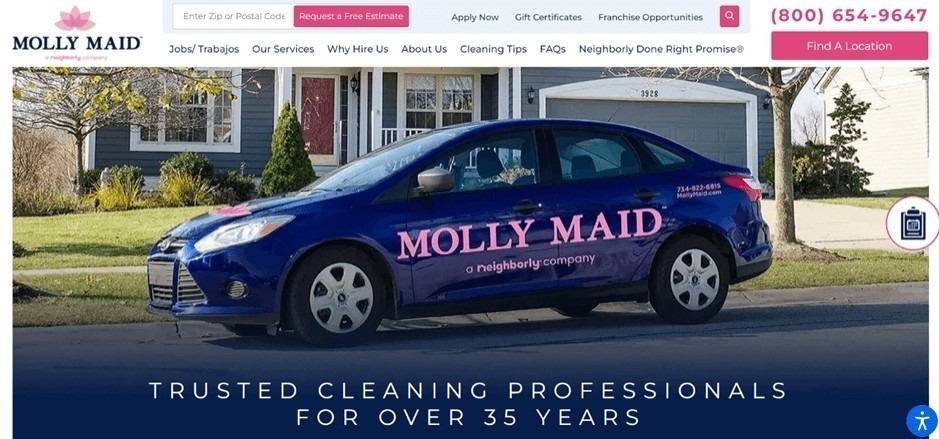
Here’s what to include on your website:
- Contact information: Make it easy for people to contact you by clearly displaying your phone number
- Business hours: Include which days and times you’re open for business
- Customer testimonials: Get as many customer testimonials as possible and put them on your landing page
- Insurance and license info: The more you show people you’re licensed and insured, the quicker they’ll become clients
- An about page: Tell people about yourself and your passion for the cleaning business; keep it short, casual, and engaging
Here’s another example of a clean website. It’s a different style to Molly Maid because it also provides commercial cleaning services.
Creating a website today is very easy thanks to the many website builders on the market. You can check out some of the best website builders here.
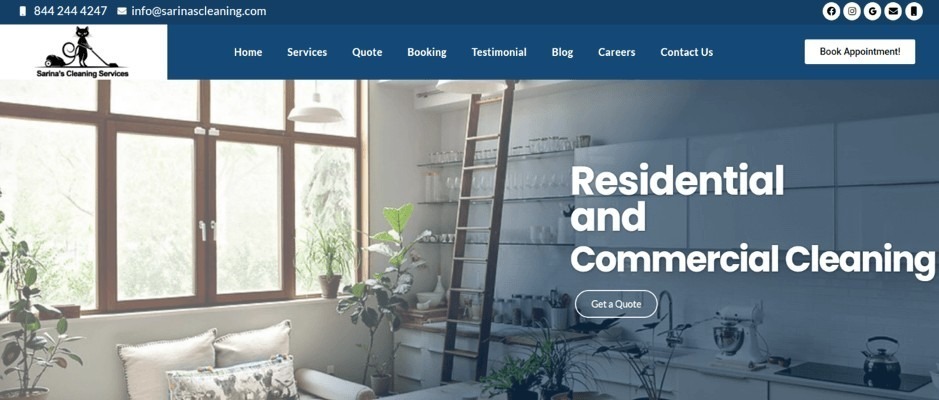
Set up a Facebook business page
Your cleaning business can have its own Facebook business page to showcase your services, share contact information, post updates, and promote seasonal deals.
It’s where you’ll create a community and connect with your Facebook audience, who’ll share your page with others interested in your services.
B’s Cleaning Service is an excellent example of setting up a Facebook page.
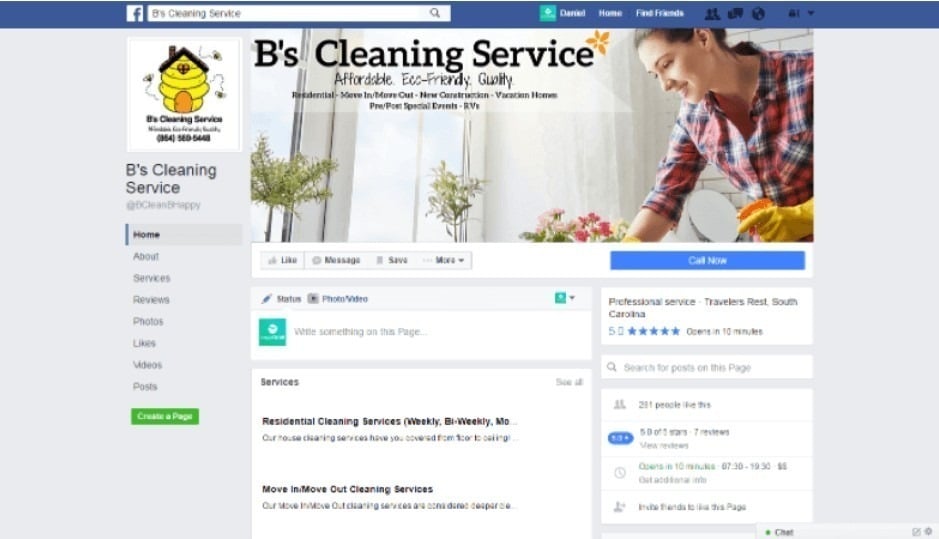
Set Your Pricing Rates
Determining your pricing rates is often the most challenging part of starting a cleaning business. Your prices will depend on several factors, including your niche, which services you offer, location, and who your clients are.
However, there are guidelines to help set your pricing rates.
The square footage method
Charging by the square foot is based on the size of the property you’re cleaning. For example, if you charge $0.10 per square foot and a house is 3,000 square feet, you multiply 10 cents by 3,000 feet and get a price of $300.
Per-room rates
You price each room separately with per-room rates because some take longer than others. For instance, cleaning a kitchen and bathroom might take longer than a bedroom or lounge.
Per-hour rates
The average cleaning business rate for residential properties varies from $25 to $50 per hour; that’s what you charge for yourself and any employees.
Rates differ because of location and the clients you serve; you can find your local average hourly rates by researching your competitor’s prices.
The rule here is don’t charge too little as it’ll undermine your professionalism or too much as you’ll price yourself out of the market.
The only downside with charging by the hour is the faster you work, the less you’ll earn per hour.
A flat fee
You provide your service for an agreed set price when you charge a flat fee, and they’re often better for you because the quicker you work, the more you’ll earn.
For example, you start your cleaning business and get 4 residential clients and charge $100 per house; if each takes 4 hours to clean, you’ll earn $25 per hour.
Reduce that time to 3 hours, and you’ll earn $33 per hour. The time decreases, but your wage increases.
The flat-fee pricing model eliminates problems associated with charging by the hour and removes any price matching disagreements between you and your client.
You’ve come a long way and are almost ready to start a cleaning business; your last step is getting those clients.
Get Your First Clients
Your cleaning business needs clients, and there are ways of getting them using traditional marketing techniques and free online advertising. The great thing about the following methods is they’re easy to do and are affordable.
Van signage
Van signage is an excellent way of promoting your business to your local community, and once you pay for it, you have it for life.
It comes in 2 forms: An entire vehicle wrap or vinyl graphics, including your name, logo, and contact details.
Your business name and details are always on display when you advertise on your work vehicle, which is excellent for building brand awareness and getting new clients.
How to use van signage
Contact local van signage suppliers and discuss the best option for your business; some things you can include are:
- Your choice and style of lettering
- Your business logo
- Contact details
- Printed graphics
- Photos of past work
- And bespoke artwork that grabs people’s attention
Word of mouth
Word of mouth marketing describes when people tell other people about a business, product, or service positively.
It’s proven to be the best form of advertising because we trust recommendations from friends and family far more than advertisements.
In fact, statistics show that 92% of people trust word of mouth marketing more than any traditional strategy.
How to encourage WOM:
- Nurture your best clients to encourage referrals.
- Ask your clients for reviews, don’t be shy!
- Use your Facebook page as a client referral channel.
- Make it easy by using tools that automate the WOM process.
- Always go above and beyond for every client and do a little extra.
- Provide fantastic service and support.
Flyers
Flyers are single sheet advertisements used in broad distributions sent through the mail, displayed in public places, or handed out to your target audience.
They contain a simple message and are great for drawing attention to your business and services and telling people what you do.
Flyers are a cheap and effective way of spreading the word and telling the public about your new cleaning business.
Not everyone looks for cleaning services online. Flyers are how you get your business inside people’s homes, so they know who to call when they need a cleaning service.
How to use flyers:
Design your flyer so people can see the message. Include your business name, branding, professional imagery, the services you provide, testimonials, and contact details.
You can display flyers in public places (get permission first) such as malls, supermarkets, and stores or pay the postal service to deliver them throughout your neighborhood.
Google My Business
People use My Business to find local businesses, so it’s a must for every new cleaning business.
It lets you show your business details and review rankings, photos, location, and services.
Here’s how it looks:
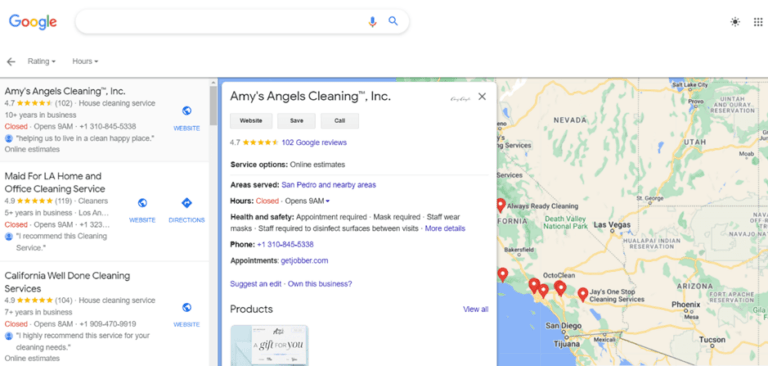
Why Google My Business is important for your business
Recent Google statistics show that 86% of people use it to find local businesses and services. That statistic alone shows why it’s essential to have a Google My Business listing for your new cleaning venture.
Here are some ways Google helps promote your business:
- Increases your brand’s online visibility
- You can share important information with potential clients
- Show reviews to boost your appeal
- It can increase visitors to your website
- It’s free advertising
How to use Google My Business
You can create your Google listing in a couple of minutes and update it by going to the Google My Business setup page.
Conclusion
Now you know all you need to know about how to start a cleaning business.
Approach it as you would cleaning a house, work on each step until complete, then move to the next, and before you know it, you’ll be cleaning up and be getting paid to do it.
